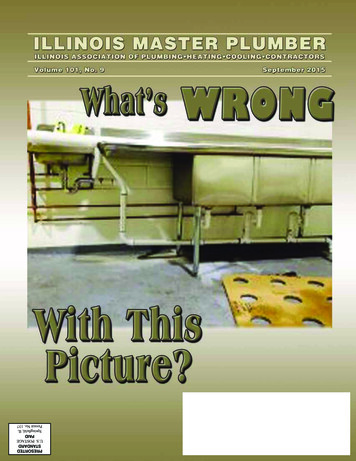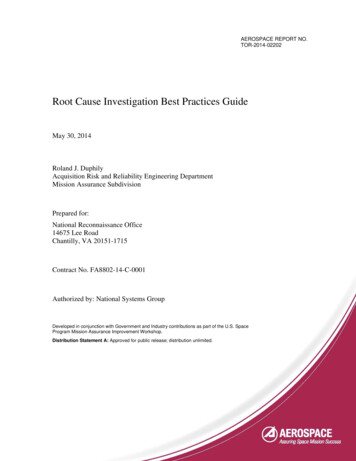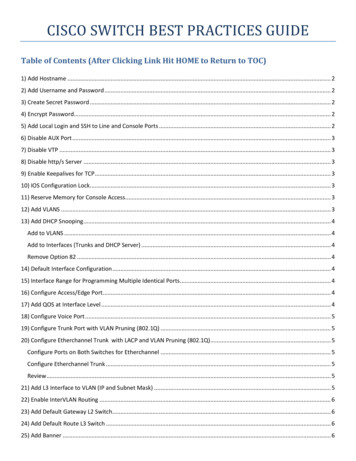
Transcription
Best PracticesGuideInternational Association of Chiefs of PoliceSmal ler Police Department sTechnical Assistance ProgramInternal Affairs:A Strategy for Smaller Departmentsby DeputyChief Beau ThurnauerThis project supported by a grant from:
Best Practices Guide forInternal AffairsA Strategy for Smaller DepartmentsBy Deputy Chief Beau Thurnauer, East Hartford, Connecticut, Police DepartmentChief of Police, Coventry, Connecticut, Police Department [retired]Note: Local policies and procedures on internal affairs investigations require input andreview from appropriate legal advisors (for example, city or county attorneys). Conceptspresented in this article reflect best practices, but must be adjusted/refined byknowledgeable legal advisors in each community.IntroductionEvery police department large and small will sometime have to deal with a complaint concerning an officer’sconduct or behavior. Although the process of handling these complaints varies between agencies of differentsizes located in different parts of the country, there are some basic similarities that thread themselves throughlaw enforcement in general.Every Chief must have a good handle on the purpose of investigating internal inquiries and take themseriously if they are interested in earning the respect of their political body, the citizenry they serve, and theofficers and civilians who work for them.The NeedSworn officers hold awesome power. We have the unique authority to remove a person’s freedom and to usedeadly force. And although the nation’s majority believes we use these authorities appropriately, there arethose who believe that the police take advantage of and abuse their power on a routine basis. An internalaffairs investigative process is meant to ensure that department policy and procedures are followed and thatall department employees follow agency standards of professionalism.Since law enforcement is accountable to everyone regardless of their opinion of us, we are obliged to ensurethat our officers operate within the confines of the law and according to procedure. The minute we detectany violation of not only statutory rulings, but of internal policies, we must investigate the incident and bringabout swift and just correction, if required. Those town and city police departments that have not instilledconfidence that every complaint will be examined, are inviting unnecessary complainants that are likely toreach town managers, mayors, and civilian review boards. Effective IA units will ensure that complaints areheard at police headquarters and that they are dealt with quickly and effectively.Sworn officers are normally complained about more than other employees, however, we must never discountthe importance of our civilian staff members who interface with the public and may also be the subject ofcomplaints. In both smaller and larger departments civilians often work in dispatch centers, handle animalcomplaints, and may hold other positions that have a great deal of public contact. Complaints surroundingcivilian staff conduct must also be investigated swiftly and fairly to ensure and maintain departmentcredibility, confidence, and adherence to policy.-1-
In today’s police environment, Internal Affairs, also commonly called Offices of Professional Standards, aremore important than they have ever been. Claims of misconduct and video recordings of police actions arenow posted on to social media sites as they happen and given freely to television stations. Investigatorsshould make sure they ask complainants if any video exists and strive to get copies when possible. If officersare wearing cameras, that footage may be the most important piece of evidence you collect.ComplaintsWho Receives Complaints?Written IA policies are recommended and should always specify clearly who receives complaints. Mostagencies allow complaints to be received at any level. In most agencies of 10 or fewer employees, the Chiefwill normally want to receive the complaint and investigate it. If there is a rank structure, it is most effectiveto assign the reception of the initial complaint to a supervisor. This practice allows the supervisor to assumesome of the responsibility of his or her subordinate’s actions. It is common for all complaints to be referredto a specific IA intake officer, usually a supervisor. However, the practice of assigning complaintinvestigations to an IA unit, away from the first line supervisor, may cause that supervisor to feel that he orshe has lost the responsibility of corrective action with his or her officers when they make a mistake. This cansometimes be interpreted as undermining authority so investigative procedures must be developed with thisin mind. You may want to include the first line supervisor in the decision-making process, or you may not,depending upon personnel and other relevant issues.In either case, it is imperative that any investigation should be completed by someone of higher rank than theperson who is the subject of the investigation. Avoid having a senior patrolman investigate a junior officer.Nothing causes hard feelings faster than officers of equal rank investigating each other.Every officer should know exactly where to refer a complainant or be prepared to receive the informationand pass it on to a supervisor. For example, if a patrolman is on the street and a citizen comes to him andcomplains that a cruiser was driving too fast the night before, the officer should be clear about exactly whatto do with the information. It is never advisable to respond with anger or defensiveness.Which Complaints to AcceptA simple declaration stating that ALL complaints against any member of the police department will bereceived and investigated leaves little room for dispute. CALEA Accreditation Standard # 52.1.1 states, “Awritten directive requires all complaints against the agency or its employees be investigated, to includeanonymous complaints.” It also prevents the age-old problem of certain complaints being discounted orrejected for purely subjective reasons. It is difficult to explain to a citizen why one complaint was acceptedand one rejected for basically the same offense. This kind of inconsistency brings a supervisor’s objectivityinto question when his or her peer has accepted a complaint in the past for a similar offense.It is important for each department to, 1) set the rationale for receiving complaints, 2) assign a person thetask of receiving them, and, 3) specify in a formal policy format which complaints are accepted. A bright linerule, stating clearly that all agency employees will accept any and all complaints is the easiest to understand and teachother employees. It is not the easiest for most employees to accept.Some departments feel that the credibility of the complainant should be assured by requiring a swornstatement from those who make the complaint. This can ensure sincerity, but it can also discourage honestpeople who may be skeptical or reticent. At no time should a department seek to discourage a person frommaking a complaint because the investigation process is embarrassing or difficult. A Community’s trust intheir local police department is solidified when our citizens know we want their input and will amend policies,procedures and behaviors if we find we have made mistakes.-2-
Format of AcceptanceOne common way to receive a complaint is through a formal written statement. However, a policedepartment wanting to portray an image of true responsiveness will accept complaints in any form - byphone, mail, in person, e-mail, or web form. It is highly recommended that anonymous complaints not onlybe accepted, but that the department’s policy clearly say so. Agencies run the risk of losing valuablecommunity input if the complaint process is not clear and simple.Notification of OfficerCredibility with the community is important, but credibility within the organization is vital. No employee likesto be complained about, but department staff will have a higher level of public support if every investigationis done fairly and uniformly. Unless a criminal investigation prohibits it, the officer who is being complainedabout should know the circumstances of the complaint immediately. This standard should be no differentthan in our court system in which the accused has a right to face his or her accuser. Anything less will createan environment of distrust and defensiveness within the department. The chief will always want to avoidhearing staff say, “.Even criminals are treated better than cops.”The Chief of Police determines when employee notification of a complaint is made. Normally, the employeeis notified the day the complaint is received. This can be done in several different ways.It is preferable to provide an employee with a copy of any written complaint. Administrators may also haveguidelines in collective bargaining agreements that have to be met concerning complaint procedure. The term‘transparent’ may be overused but in its true sense it means that everybody knows everything. Transparency isencouraged with IA issues. That does not mean that gossip is acceptable but does mean that there should beno secrets.At this time, the officer who will be investigating the complaint should be notified. In smaller agencies, policyor tradition may stipulate that the Chief of Police will investigate all complaints. If this is not the case, theemployee should know which supervisor will be conducting the complaint investigation. It is also advisable tosend a letter to the complainant acknowledging the receipt of the complaint. This letter notifies thecomplainant that an investigation is commencing.Since few members of the public truly understand the complaint process beyond what they have seen on TV,complainant notification often averts an irate phone call to Town Hall wondering why his or her complainthas not been attended to.Administrative vs. Criminal Complaint ProcedureFew things cause more confusion within police agencies than the difference between administrative andcriminal procedures involving a complaint. This discussion will not examine the many legal ramifications, butwill include procedural basics to guide chiefs and command staff.Immediately after the complaint is received, the person assigned to investigate will usually be able todetermine whether or not there is a criminal element to the case. If there is no criminal element then theinvestigation is purely administrative, meaning that the result will be personnel action not criminal action. Ifthere is even a hint that there is criminal behavior on the part of the employee, then one option is to separatethe matter into both a criminal investigation and an administrative investigation.The difference between a criminal or administrative investigation is distinct. Each requires careful proceduresbe taken at each step in order to comply with the law and agency policy and procedures, while taking care notto jeopardize prosecution, should that become necessary. Some departments run these investigationssimultaneously while others prefer to complete the criminal investigation prior to beginning theadministrative investigation. If a criminal investigation is needed, use Miranda rights where applicable andproceed no differently than you would in any other criminal investigation. However, chiefs must not fail to-3-
take administrative action even if a criminal investigation is underway when public or other officer safetycould be compromised. For example, the IACP Model Policy for Police Officer Domestic Violencerecommends that if a DV incident is confirmed, the officer be placed immediately on administrative leave andsurrender his or her weapon. Failure to take administrative action regarding serious complaints, can leave thechief, agency, and city vulnerable to legal liability and public criticism.When the criminal investigation has been completed, begin the administrative part. Give Garrity warnings ifyou feel it is appropriate. Garrity warnings are similar to Miranda, but warn the employee that failure to fullydisclose information that is related to the office held, may result in disciplinary action up to and includingdismissal. [See Edward J. GARRITY v. State of New Jersey (385 US 493)] You will probably not use Garrity inevery circumstance. If an employee gives you the full story with no evasiveness then your job is complete, butif they are uncooperative, then Garrity is in order.Some departments do have policy that requires Garrity every time an inquiry is made. This procedure can becumbersome when you have a rudeness complaint and you know you can resolve the issue by talking to theofficer who may say, “Gee, I had a rotten day that day and I promise I will never let this happen again.” Aword of caution is in order, however, if during your routine administrative investigation, you suddenlyuncover information that makes you think that criminal activity may be involved. In such a case, you shouldimmediately cease your administrative inquiry and have someone else begin a criminal investigation.If you have received information under Garrity rules, no information that you have obtained can be sharedwith the criminal investigator. A short example will make this clear. Let us say that a complainant comes toyour office and states that an officer was rude during a motor vehicle stop - obscene and insulting. You thencall the officer into your office and give him Garrity warnings.The officer gives you a written statement saying that the violator had been stopped three times in the past andwas a habitual offender who was just trying to get out of a ticket by making a complaint.When you interview the passenger who was in the car with the complainant, you determine that the passengergave the officer 100 not to give the complainant a ticket. You decide that you want the officer arrested if theallegation turns out to be true. Since the statement that the officer provided was origina
Every Chief must have a good handle on the purpose of investigating internal inquiries and take them seriously if they are interested in earning the respect of their political body, the citizenry they serve, and the officers and civilians who work for them. The Need. Sworn officers hold awesome power. We have the unique authority to remove a person’s freedom and to use deadly force. And .











